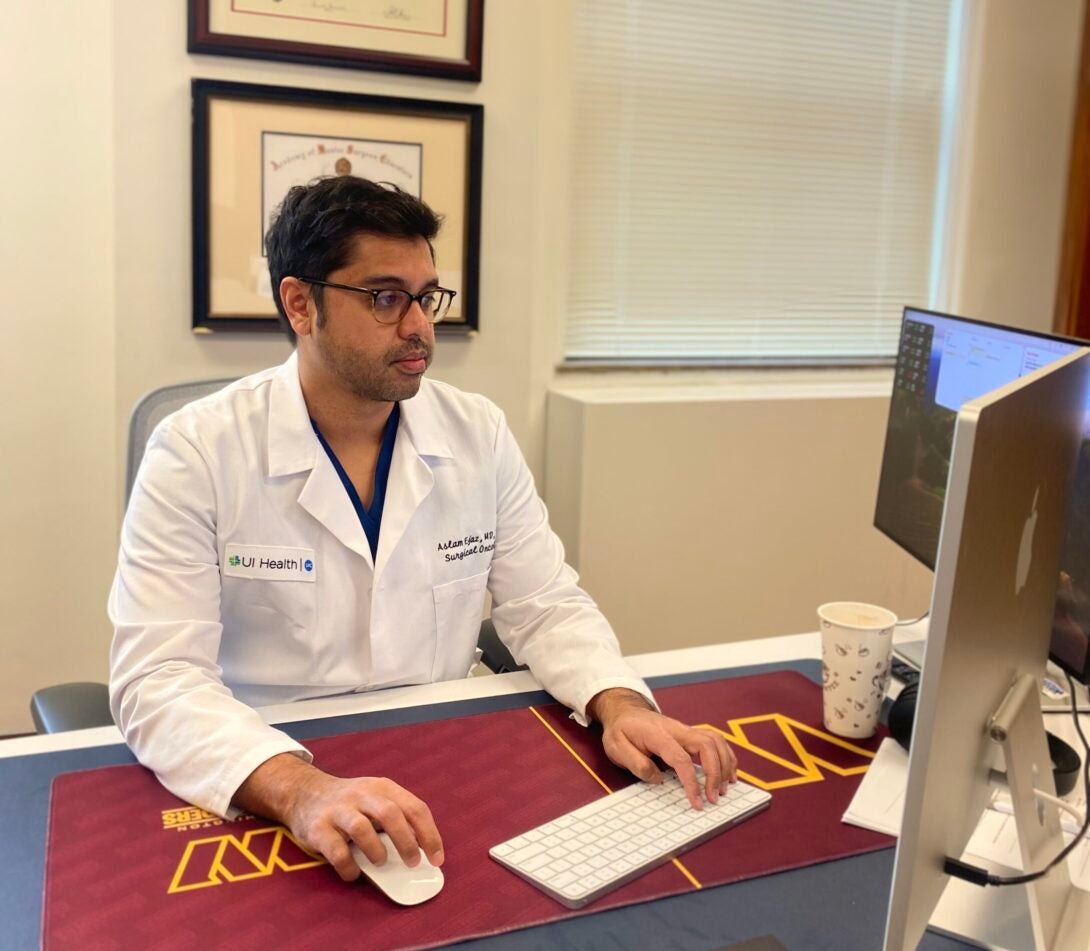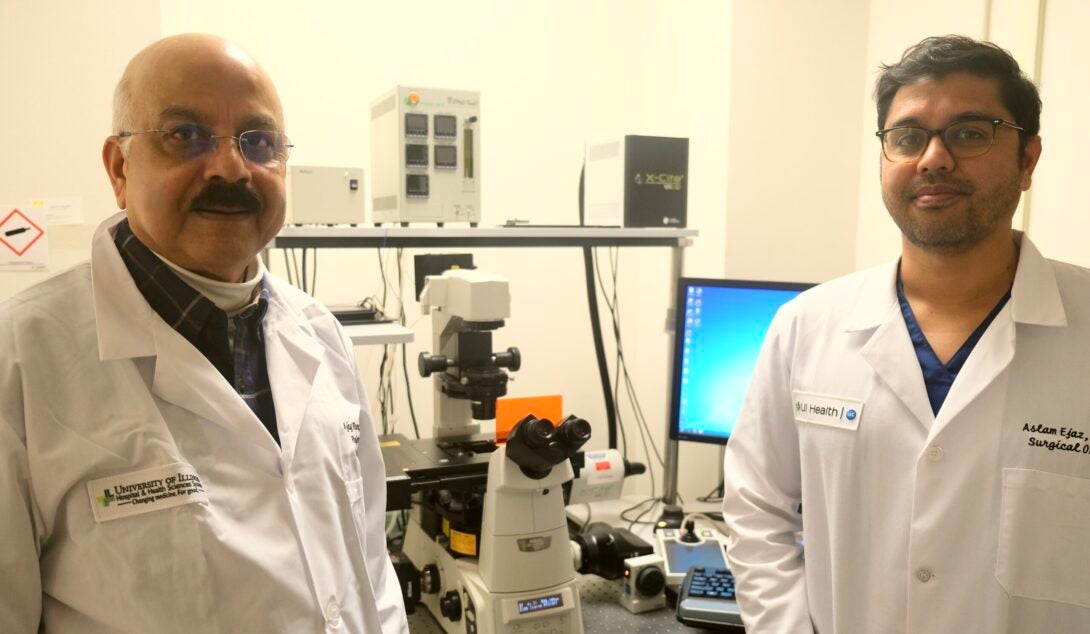World Cancer Day: Precision Care at UI Health’s Surgical Oncology Program
Every year on Feb. 4, World Cancer Day serves as a global reminder of the ongoing fight against cancer and the importance of innovation, collaboration, and compassion in patient care. At the forefront of this mission is the Surgical Oncology Program at UI Health, led by Dr. Aslam Ejaz, the program’s chief and surgical oncologist. Under his leadership, the program's team works tirelessly to transform cancer treatment—one patient at a time.
“Every cancer. Every patient is different,” says Dr. Ejaz. “So building that relationship first and foremost and providing some sense of hope that we can develop a plan to treat their cancer is extremely important.”
The team knows that every patient and cancer diagnosis is different. Over 70% of their patients come from minority backgrounds, and many face challenges like limited access to healthcare, cultural differences, and lack of support. The program focuses on treating breast, skin, and abdominal cancers. They work hard to understand each patient’s needs and provide personalized care. A patient’s medical history and access to care are important in deciding the best treatment plan.
Ensuring Patients Are Involved Heading link

“Education in the clinic is one of the most important things we do,” Dr. Ejaz says. “So, it’s not just education on their cancer or their treatment – but everything else that goes into it. One of the things that patients can do to mitigate any risks is to be in good physical shape and eat a healthy diet. And if they are unable to or face barriers to do that, then we find solutions to help them.”
The program has studied “prehab,” which involves getting patients ready for surgery with exercise and treatment beforehand. By helping patients get as strong and healthy as possible, the team lowers risks and improves recovery. This plan starts right when patients first meet with the team.
The program’s main goal is to help patients recover and return home after surgery. Some patients with serious conditions, like advanced pancreatic cancer, may not be strong enough for surgery because of weight loss or weak muscles. For these patients, the team helps them get in the best health through physical therapy, better nutrition, and prehabilitation plans so they are ready for the procedure.
Putting Patients at Ease
These surgeries are often highly complex, addressing rare and challenging cancers that require a multidisciplinary approach.
Dr. Ejaz highlights the importance of clear communication within the team to give patients confidence and comfort. By working together, the team helps patients feel supported and understood during their care. “I think patients feel at ease when they know, first of all, that the entire team is on their case,” he says. “And that we’re paying attention to their specific cancer and needs.”
Patients often work with a full care team, including experts in radiation, palliative care, nutrition, therapy, and more. Some patients can also join clinical trials, which add new research to their care plan.
Facing so many consultations and decisions can leave patients feeling overwhelmed during one of the hardest times in their lives. While patients navigate specialists and treatments, Dr. Ejaz and his team work to guide them and provide support.
“What I try to put them at ease about is that you want to have these operations done by a surgeon and a team who does them a lot. Experience translates to outcomes,” Dr. Ejaz says. “Even though these are rare cancers, we see a high volume of them. Not just me, but the rest of the team. With the outpatient clinic and inpatient floor, we are all very experienced in treating these complex types of surgeries.”
Minimally Invasive Approach
The program focuses on minimally invasive surgery for most patients, using smaller incisions, which often leads to less pain and quicker recovery.
New robotic technology has made these types of procedures even more effective. “There are operations that we can do now that we weren’t able to do 10-15 years ago in a minimally invasive fashion,” Dr. Ejaz explains.
Beyond robotic surgeries, the team also uses advanced techniques like ablation procedures, where a needle probe targets and destroys cancer cells without making cuts in the abdomen. These procedures have become key in treating patients. “The technology is going in the direction where we want to be less and less invasive,” Dr. Ejaz emphasizes. These innovations represent a significant leap forward, offering patients effective treatment options with less physical disruption and a smoother recovery.
Caring Beyond the Operating Room Heading link

Recovery and rehabilitation are important parts of the entire care process, going beyond surgery. Dr. Ejaz and his team regularly check on patients after their procedures to ensure their recovery is on track and to help with any challenges. This approach highlights their commitment to supporting patients at every stage, from diagnosis to aftercare.
Additionally, the team is shaping the future of cancer care by working with a multidisciplinary group of researchers, led by Dr. Ajay Rana, Co-Lead of the UI Cancer Center Translational Oncology Research Program, to uncover the causes of liver cancer and develop innovative treatment solutions. “It’s a nice translational project because it melds both our clinical expertise, their expertise, and the laboratory to try and figure out the next solution,” Dr. Ejaz says of the collaboration’s prospects.
These efforts not only highlight the program’s dedication to advancing treatment but also reflect their unwavering commitment to improving the lives of patients by combining compassionate care with research to tailor each treatment process individually.
The Surgical Oncology Program at UI Health is here to provide expert care. To schedule an appointment or learn more about the treatment options available, visit our website or call us today at 312-355-4300.